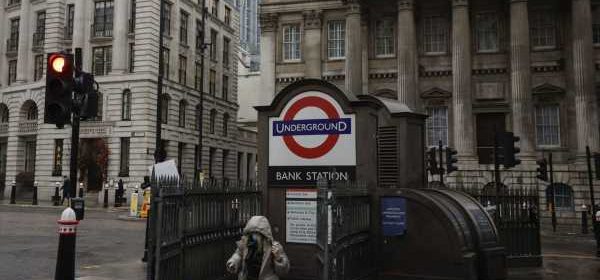U.K. Is Back in Lockdown as Hospitals Face Breaking Point

Boris Johnson imposed a third coronavirus lockdown across England, shutting schools and ordering the public to stay at home, amid dire warnings that the National Health Service is at risk of being overwhelmed.
The emergency measures will start immediately and last until at least Feb. 15, potentially devastating retail and hospitality businesses and threatening to push the economy into a double-dip recession, as medics try to get a grip on the pandemic.
In a televised address to the nation, the prime minister insisted he had no option but to close down all social activities, education and non-essential travel in the face of a sudden and severe surge in infections. Similar steps are being taken across the rest of the U.K., he said.
The government now aims to rush out a vaccination program, reaching 13.9 million vulnerable people and carers by mid-February so restrictions can begin to be lifted.
“Our hospitals are under more pressure from Covid than at any time since the start of the pandemic,” Johnson said in the broadcast. “With most of the country already under extreme measures it’s clear that we need to do more to bring this new variant under control while our vaccines are rolled out.”
Police Fines
The police will have legal powers to use fines and dispersal orders to enforce the rules. Parliament will be recalled to debate the measures on Wednesday but the regulations are due to become law on Tuesday, officials said.
The prime minister was forced to act after data showed new infections soaring past 50,000 a day and more people in the hospital than in the first peak of the virus in April.
By Jan. 4, there were 26,626 patients in hospital with Covid-19, a 30% increase in a week, which the government is blaming on a surge in infections from a new, faster spreading strain of the virus.
| Johnson’s Third Covid Lockdown Rules for England |
|---|
|
Johnson resisted pressure from scientists and opposition lawmakers to lockdown the whole country in December. He cut back plans to allow families to mix over Christmas, but insisted he wanted to avoid nationwide curbs like those seen in March, choosing to keep a regional tier system in place instead.
But government chief medical officers for the four nations of the U.K. warned on Monday that the health service may not be able to cope without urgent action now. They issued a statement two hours before the prime minister’s announcement, saying the NHS is “under immense pressure” already.
Overwhelmed
“We are not confident that the NHS can handle a further sustained rise in cases and without further action there is a material risk of the NHS in several areas being overwhelmed over the next 21 days,” they said in a statement which said the national alert level is now at the highest level five. “Cases are rising almost everywhere.”
Scotland earlier announced a lockdown starting at midnight. “We are now in a race between the vaccine and the virus,” First Minister Nicola Sturgeon said as she ordered Scots to stay home and for schools to remain shut.
Johnson has made keeping schools open for face-to-face learning a priority for his government, but scientists warned last month they would have to close to stop the virus from spreading. While children rarely suffer badly from the disease, they can infect their families after catching it from their friends.
It’s a far cry from the government’s optimism in early December, when the arrival of vaccines was described as the “scientific cavalry” coming to the rescue.
On Monday, the premier insisted he wanted to vaccinate about 14 million older and vulnerable people and their carers, including frontline medics, by the middle of February.
“If we succeed in vaccinating all those groups, we will have removed huge numbers of people from the path of the virus,” Johnson said. “And of course, that will eventually enable us to lift many of the restrictions we have endured for so long.”
But there will be a “time lag” between vaccinating patients and the pressure on the NHS easing, Johnson said, adding that he is “cautious about the timetable ahead.”
The dilemma for the government has been to try to balance attempts to stop the spread of the virus against the need to keep shops and businesses open to protect the economy, which has already suffered its deepest recession since the Great Frost in 1709.
A double-dip recession is looking increasingly inevitable as a result of the new lockdown. Before Johnson’s announcement, most economists expected the U.K. economy to eke out some growth this quarter.
Four weeks of school closures could cost as much as 3% of GDP, according to a tweet by Ludovic Subran, chief economist atAllianz SE. Bloomberg Economics estimates that as much as 6% of Europe’s labor supply could be affected by the narrowing of childcare options.
— With assistance by Alex Morales, Lucy Meakin, and Joe Mayes
Source: Read Full Article
